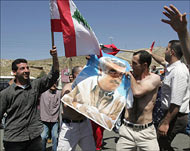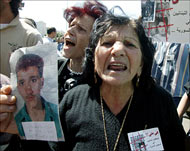Syrian pullout evokes mixed feelings
Syria has officially informed the United Nations that it has completed its withdrawal from Lebanon, but for some there are memories that linger.

Lebanese soldiers have slowly started to fill the vacuum left by Syrian troops and intelligence units who in recent weeks have packed up and vacated buildings they inhabited for most of the past 29 years.
A paper plastered at the entrance of a Syrian military intelligence office in the eastern town of Anjar – 58km from Beirut and close to the Syrian border – and signed by the Lebanese Army reads: “This is a military centre. It is not allowed to enter the building or get close to it.”
The Syrian military intelligence headquarters since 1976 had been just beside the famous ruins of the Islamic Umayyad Dynasty in Anjar.
Now, several Lebanese soldiers are stationed outside this former detention centre, stopping journalists from looking around.
Bitter memories
The Anjar military intelligence office may be a place where some memories will never leave.
 |
|
There were joyous scenes as |
A construction contractor points at the two-storey building, covered with graffiti, and says: “This is the Prophet Yusuf Centre. That’s where the Syrians tortured people.”
The contractor claims he still remembers the screaming of detainees whom he heard when he took his truck to do some digging work about 20m away from the centre.
“They were screaming from pain,” he recalls. “I finished my work quickly to get away from there.”
Remon Buban, a commercial driver, remembers the seven days he spent at the centre in 1986. He was then transferred to Syria where he was moved from one detention facility to another over 12 years.
“I hate the Syrian regime. I hate it more than you can imagine,” he says. “I was tortured for years and years and was thrown in prison because of a fake accusation.”
Syrian-Lebanese ties
But Buban says he will never forget the friendships he made in prison with Syrian inmates.
“The Syrian people are very simple and good people,” he says. “Every time one of them used to receive a family visit, he would invite me to share the food his family brought him.”
 |
|
Some Lebanese say Syria wrongfully imprisoned them |
Rafi Tamourian, 25, told Aljazeera.net he was happy to see the Syrians leave – as his mother kept interrupting him in Armenian, obviously trying to stop her son from answering questions involving Syria.
Armenians are Anjar’s main inhabitants.
“Maybe they are our brothers, but they have treaded on our hearts for a long time now,” he said.
Residents in the Hizb Allah stronghold of Yahfufa, a small village tucked in a valley and surrounded by mountains, support Syria, saying it backed the armed resistance in forcing Israel to pull out its troops from Lebanon in May 2000.
“It’s true Syria is getting out of the country, but our relations must and will become stronger,” a Hizb Allah guard told Aljazeera.net.
Honouring Syrian dead
In the neighbouring village of Riyak, a cornerstone for a monument to honour Syrian soldiers killed in Lebanon’s wars was laid during a farewell celebration which included a military parade for separate Lebanese and Syrian battalions.
|
“It’s true Syria is getting out of the country, but our relations must and will become stronger” Hizb Allah guard |
“Let’s remember our martyrs,” a commander shouted. The Lebanese and Syrian soldiers roared three times in unison: “We will never forget them.”
A Syrian journalist covering the farewell celebration addressed his Lebanese colleagues with “mabruk”, a congratulating salute.
“I’m happy. I don’t want oppression to be practised against the Lebanese in my name,” he said, adding he hoped his country would continue to go through changes under the leadership of Syrian President Bashar al-Asad.
On the main road at the border town of Masnaa, a Syrian army officer filmed green military buses filled with soldiers and lorries crammed with their belongings as they headed back to Syria.
“The filming is just to keep the memory,” he told Aljazeera.net. He had come from Damascus especially to film his retreating colleagues. Asked if they were happy, he said: “I don’t think anybody wants to leave Lebanon this way.”